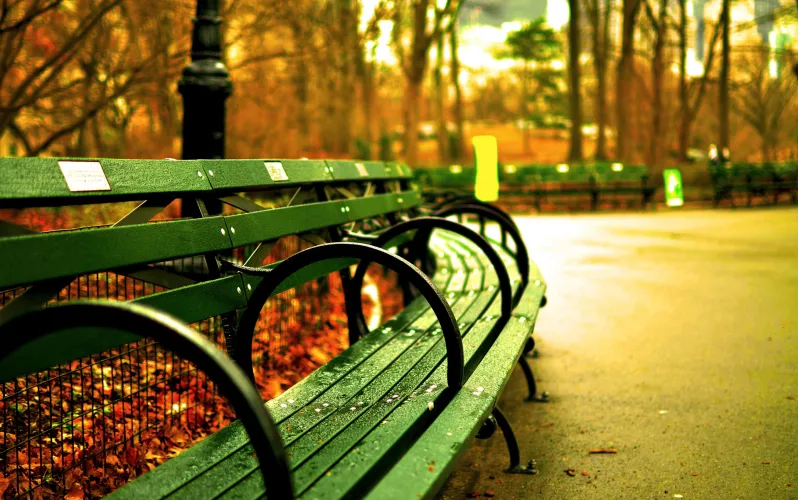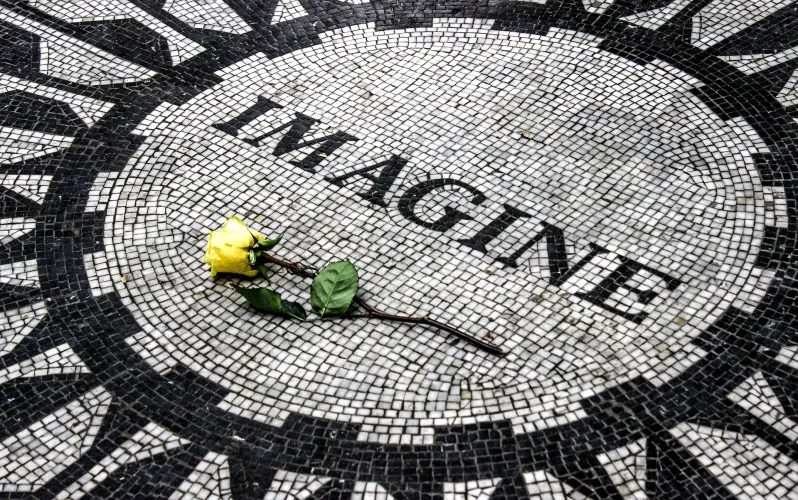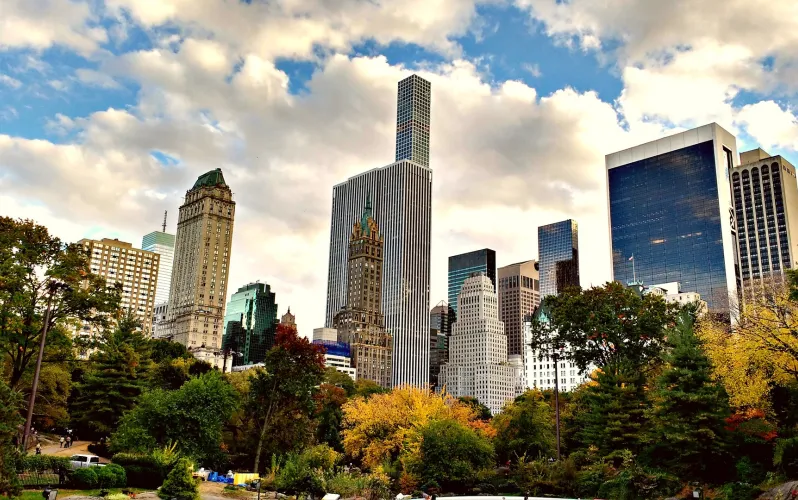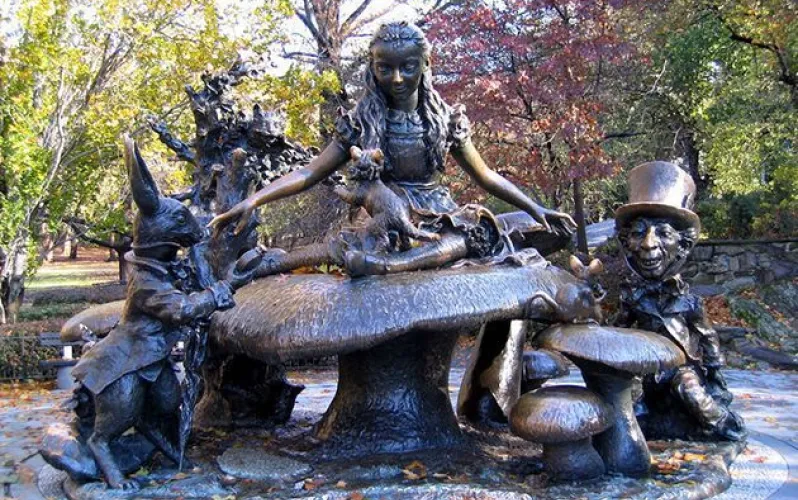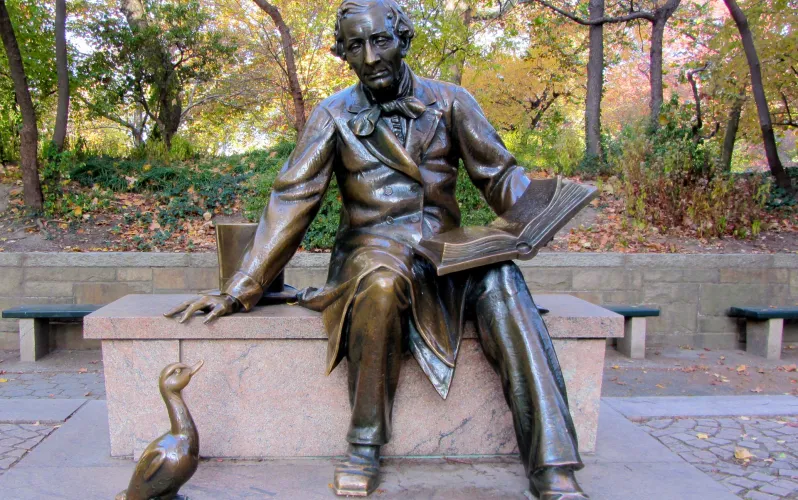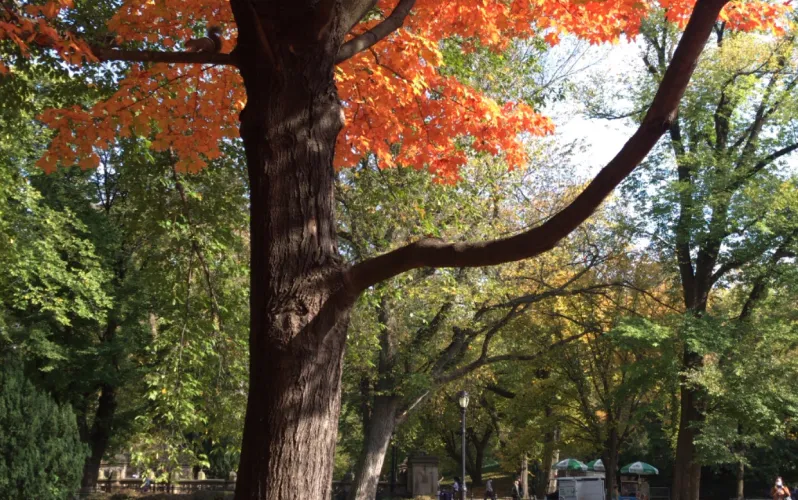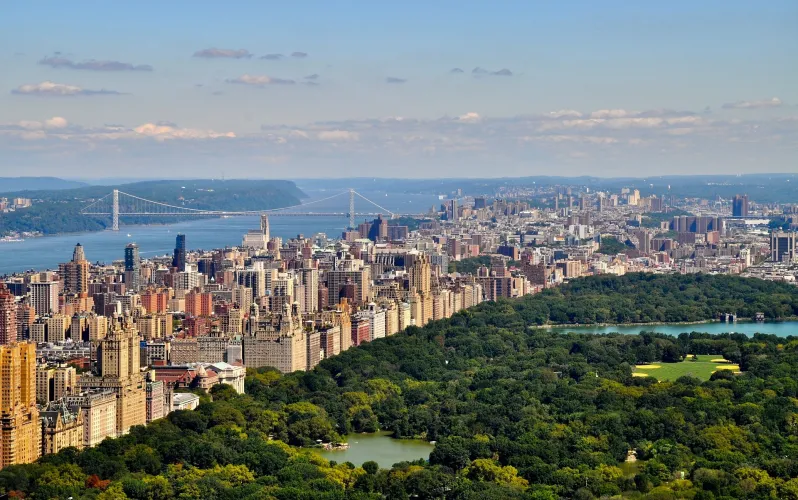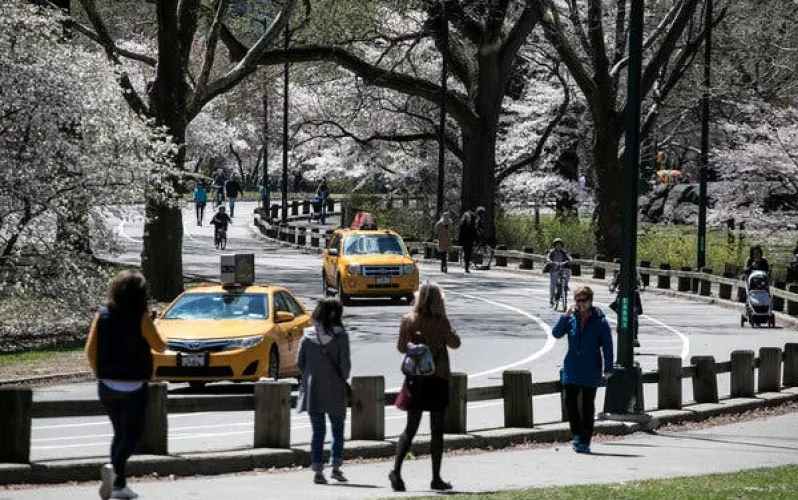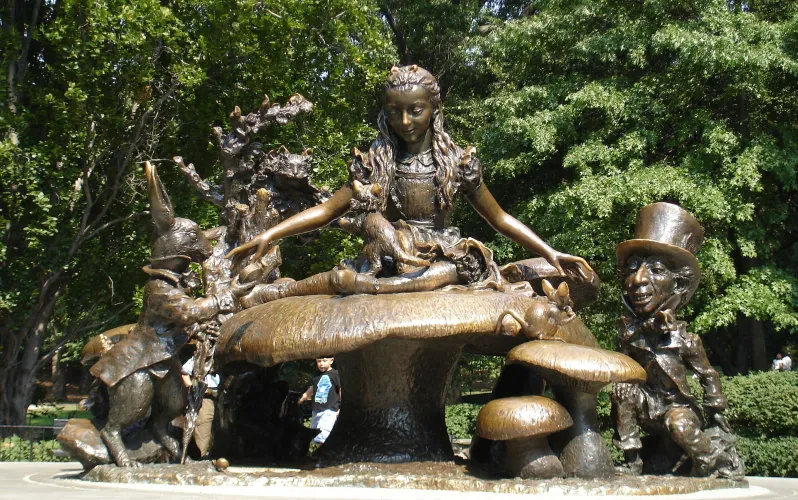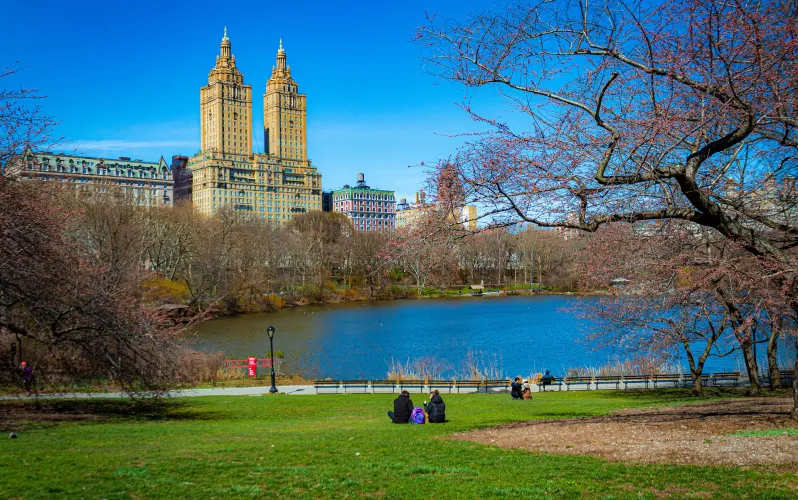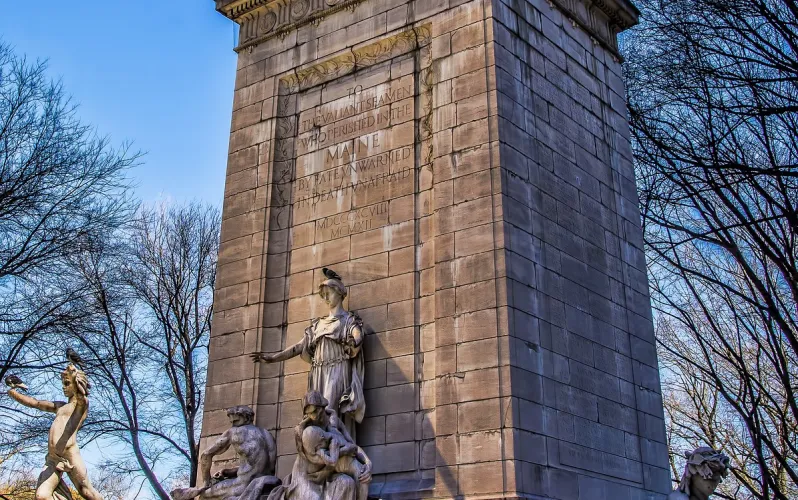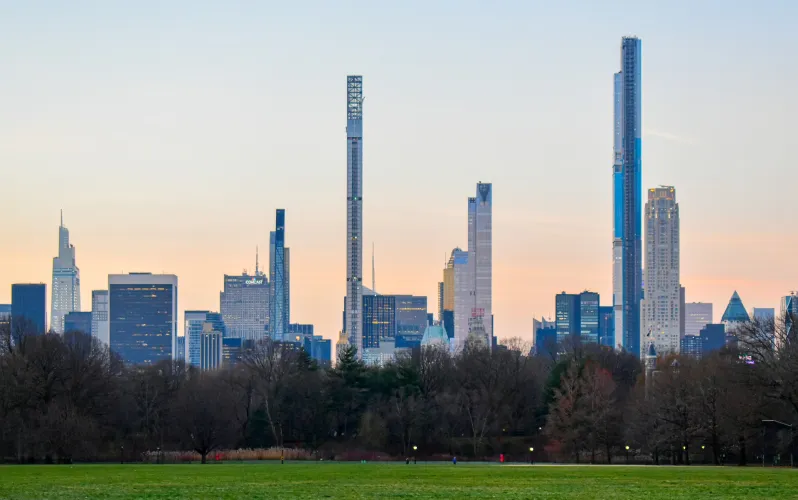ZENTRALPARK, NEW YORK CITY
ZENTRALPARK, NEW YORK CITY
Der New Yorker Central Park erstreckt sich über beeindruckende 800 Hektar. Wenn Sie also nicht die ganze Zeit auf der Welt haben, brauchen Sie möglicherweise Hilfe bei der Suche nach den besten Teilen! Einheimische und Besucher lieben es, den Central Park zu besuchen, da er Ruhe in der sonst chaotischen Stadt bietet. Sie werden es lieben, an den Ramble-Waldwegen entlang, entlang des Sees mit dem legendären Bootshaus und durch berühmte Flecken wie die Schafwiese zu schlendern
An Kultur mangelt es im Central Park nicht! Sie werden wahrscheinlich einige talentierte Straßenmusiker finden, wenn Sie durch die Bethesda Terrace Arcade gehen, aber im Park befindet sich auch das berühmte Delacourt Theatre (Heimat von Shakespeare im Park), und wir beenden unsere Tour am berührenden John Lennon-Denkmal Strawberry Fields. Obwohl es ein stiller Bereich sein soll, werden Sie sicher einige talentierte Beatles-Fans finden, die ein oder zwei Songs spielen.

Belvedere Castle
Strawberry Fields
Alice in Wonderland
Artists' Gate
Gapstow Bridge

Grand Army Plaza is a square at the southeast corner of Central Park in Manhattan, New York City, at the intersection of Fifth Avenue and Central Park South (59th Street), covering two blocks on the west side of Fifth Avenue between 58th and 60th Streets. It contains an equestrian statue of William Tecumseh Sherman on its northern half and the Pulitzer Fountain on its southern half.
Grand Army Plaza was designed by Beaux-Arts architecture firm Carrere and Hastings and completed in 1916. It was renovated in 1933–1935, 1985, and 2013. The plaza has been a New York City scenic landmark since 1974.

The Plaza Hotel (also known as The Plaza) is a luxury hotel and condominium apartment building in Midtown Manhattan in New York City.
The 21-story, French Renaissance - inspired chateau style building was designed by Henry Janeway Hardenbergh. The facade is made of marble at the base, with white brick covering the upper stories, and is topped by a mansard roof.

The Pond - Located at the southeast corner of the park, near the entrance at Grand Army Plaza, the Pond provides immediate relief from the hustle and bustle of the city just outside. This is due to a veritable wall of trees and shrubs, as well as the inspired landscaping of Olmsted and Vaux, which placed the pond below street level. This entrance was originally designed to handle most of the traffic into the park, and continues to do so until this day.

The Dairy was included in the Greensward Plan, the original plan for the construction of Central Park. Construction began in September 1869. In a progress report written by Olmsted Vaux & Co. to the Department of Public Parks, dated June 6, 1870, the architects stated, "The Dairy [is] a stone structure, the cellar of which connects directly with one of the traffic roads, it being the intention that the building should receive its main supplies from the exterior of the park.

A walkway leading to the beautiful Bethesda Terrace, the Central Park Mall runs through the middle of the Park from 66th to 72nd street. It remains the sole formal feature of Olmsted and Vaux's naturalistic creation. To the north lies the Terrace Bridge, while the Olmsted Flower Bed is located directly south of the Mall.

Bethesda Terrace and Fountain are two architectural features overlooking the southern shore of the lake in New York City's Central Park. The fountain with its Angel of the Waters statue, is located in the center of the terrace.

Strawberry Fields is a memorial to the British rock musician and peace activist John Lennon (1940–1980). The memorial consists of a five-acre landscape near the West 72nd Street entrance and includes the Imagine mosaic, where many come to pay tribute to Lennon. The memorial’s name is a reference to the 1967 song Lennon wrote and performed with the Beatles, “Strawberry Fields Forever.”

The Dakota, also known as the Dakota Apartments, is a cooperative apartment building on the northwest corner of 72nd Street and Central Park West in the Upper West Side of Manhattan in New York City, United States. The Dakota was constructed between 1880 and 1884, and was designed by Henry Janeway Hardenbergh.
מידע כללי ותנאי הטיולים
חובה על הלקוח לקרוא ולאשר כי קרא חוקים אלו
תנאי השתתפות והגבלת אחריות לטיולי "מנו טורס" המקומיים והמאורגנים.
חובה על הלקוח לקרוא ולאשר כי קרא חוקים אלו בחוברת או באתר "מנו טורס" והבין אותם ומסכים להם טרם הצטרפותו לטיול. השתתפות בטיול מהווה את הסכמתו המפורשת של המשתתף לתנאים.
המארגנים מציעים לנוסע לבטח עצמו על חשבונו, בביטוח מתאים המכסה את הנזקים והאירועים המתוארים לעיל.
מחיר הטיול אינו כולל ביטוח נסיעות לחו"ל הכולל בין היתר כיסויים רפואיים. באחריות הלקוח בלבד לרכוש ביטוח נסיעות לחו"ל הכולל כיסויים רפואיים מתאימים וזאת טרם יציאתו את הארץ. הנוסע מוותר בזאת על כל תביעה ו/או טענה כנגד חברת "מנו טורס" והחברות הקשורות, בכל הקשור לאי קיומו או קיומו של ביטוח נסיעות לחו"ל, עם דגש על כיסויים רפואיים מתאימים. ״מנו טורס״ שומרת על הזכות להסיר כל טיול שהוא שהוכרז עליו בתוכנית זו, או לערוך כל שינוי שהוא, במסלוליו של טיול כזה בלי הודעה מראש, כולל המרת נוחיות או העברה, במקרה הצורך, או במקרה שיהיה זה כדאי או רצוי לנוחות הנוסעים, בריאותם וביטחונם, או מכל סיבה שהיא, לשנות את הסדרי המסלול. שינויים כאלה יוכלו להיערך ללא קנס למארגנים, כל הוצאות נוספות שינויים במחירי מרכיבי הטיולים, יחולו על הנוסע. כל מטען שהוא – הוא על אחריות בעליו בלבד.
״מנו טורס״ אינה אחראית אם הנוסע/המטייל/המטילים לא יבקר/יבקרו באתר טיול כל שהוא, כתוצאה של מזג אויר סוער, איתני הטבע, או בגין טיסות שאיחרו או שהוזמנו בשעות שייגרמו הפסד מלא או חלקי של האתרים, הסיור כולו, או כתוצאה ממחלות, תאונות, נזק למטען, אלימות, גניבה, אבידות מטען או מסמכים, הוצאות רפואיות וכו׳.
אין ״מנו טורס״ אחראית לנזקי מטען הנוסעים והוא על אחריות בעליו בלבד.
הזכות נשמרת לצאת, לקבל, לעכב או להחזיר כל אדם המשתתף בכל טיול שהוא בכל זמן שהוא. ״מנו טורס״ מודיעה בזאת במפורש כי היא פועלת כמתווכת בין נוסעי הטיולים ונותני השירותים השונים, לפיכך "מנו טורס" אינה רואה עצמה אחראית לתקלות ונזקים שעלולים להיווצר עקב אי ביצוע או ביצוע חלקי של נותני השירותים השונים ומי שפועל מטעמם. הנוסע מקבל עותק תוכנייה זו, שהסכם זה הינו חלק בלתי נפרד ממנה. על הנוסע להביע הסכמתו וכן עובדת היות תנאים והוראות אלו מקובלים עליו בכל חוזה זה;
נזקים: אין המארגנים אחראים לנזקי הנוסע שיגרמו כתוצאה מתאונות, מחלות, נזק למטען או כל נזק ישיר או עקיף העלול להיגרם לנוסע במהלך הטיול, לרבות נזקים מחמת תאונה, אלימות, שוד, גניבה, אבידה של מטען או מסמכים, כרטיסי טיסה, דרכון, אשפוז, הוצאות רפואיות וכל נזק אחר. המארגנים מציעים לנוסעים לבטח עצמם, על חשבונם בביטוח אישי מקיף ונרחב הכולל ומכסה את האירועים והנזקים המתוארים לעיל. לא תשמע כל טענה, כי המארגנים אחראים לנזקים מהסוג המפורט לעיל שיגרמו לנוסעים במהלך הטיול. המארגנים מודיעים בזאת מפורשות כי הם פועלים בארגון טיולים כמתווכים בלבד בין הנוסעים לבין כלל נותני השירותים המבצעים את תוכנית הטיול ובכלל זאת חברות התעופה, תחבורה, ספנות, בתי מלון, מסעדות וכיו״ב. לכן אין המארגנים אחראים, בין במישרין ובין בעקיפין, בכל צורה שהיא לתקלות, שיבושים ונזקים אשר עלולים להיגרם לנוסעים מחמת אי ביצוע וגם/או ביצוע לקוי וגם/או חלקי של הטיולים המפורסמים בחוברת או אתר "מנו טורס" וכל נזק אחר אשר יגרם על ידי נותני השירותים הנ״ל לנוסעים וגם/או כל מי שיבוא בשמם וגם/או הפועל במקומם או מטעמם.
הנוסעים זכאים לתבוע במישרין את כלל נותני השירותים וגם/או חלק מהם בשל נזקים שיגרמו להם מחמת מעשים וגם/או מחדלים של אותם נותני השירותים. אין כאמור בתנאים ובמידע הכללי לעיל, כדי לגרוע וגם/או לפגוע בזכותם של הנוסעים לתבוע במישרין את כלל נותני השירותים וגם/או חלק מהם.
תנאי השתתפות והגבלת אחריות לטיולים מאורגנים ולחבילות המטייל העצמאי עם "מנו טורס":
דמי ביטול טיולי "מנו טורס" :
- שבוע ראשון לאחר ביצוע ההזמנה ללא דמי ביטול
החל משבוע ימים לפני יציאת הטיול דמי ביטול מלאים ללא החזר כספי מכל סוג שהוא.
NON-REFUND – AFTER ONE WEEK OF RESERVATION –
ONLY IN CASE OF DEATH IN THE FAMILY OR SICKNESS WITH DOCTOR DOCUMANTATION FOR BOTH PARTIES.תשלום מקדמה:
תשלום מקדמה ישולם כשבועיים לפני תחילת הסיור.
תשלום מקדמה בסך 20% מערך הסיור.
תשלום המקדמה הינו ללא החזר למעט מקרים של מוות במשפחה או מחלה באישור רופא עבור שני הצדדים המטיילים או מדריך הטיולים.
אי הגעה או אי הופעת הנוסע, איחור, מחלה, שכחת דרכון, מזג אויר וכו׳ מבטלים את זכות הנוסע לתמורה כספית כלשהי.
כלכלה: בכל הטיולים על המטייל / מטיילים להצטייד באופן עצמאי בארוחת בוקר / צוהריים / ערב.
תחבורה: על הנוסע / נוסעים לשלם עבור תחבורה מקומית במהלך הסיור / אל נקודת המפגש / מנקודת המפגש לרבות אוטובוסים / רכבות / רכבת תחתית / מונית / UBER / LYFT. חברת "מנו טורס" לא תשלם עבור תחבורה מקומית ביעד / יעדי הסיור.
אשרות ודרכונים: דרוש דרכון ישראלי בר תוקף ואשרת שהייה חוקית רבת כניסות בארה״ב במעבר גבול עם קנדה. משנת 2016 יש צורך באישור כניסה אלקטרוני לקנדה שניתן למלא באתר האינטרנט של ממשלת קנדה.
משנת 2023 יש צורך באישור כניסה אלקטרוני לארצות הברית שניתן למלא באתר האינטרנט של ממשלת ארצות הברית. אין המארגנים אחראים לנזקי הנוסע שיגרמו עקב אי טיפול באשרות מתאימות, טרם יציאתו מהארץ או בחו״ל או יציאתו עם דרכון מוגבל, או אי התרת כניסתו לארץ זו או אחרת מכל סיבה שהיא.
באחריות סוכן הנסיעות לוודא כי אכן ברשות הנוסע דרכון בתוקף ו/או ויזה לחו״ל ו/או כל מסמך דרוש אחר (כמו מקרה של אישה בהריון) – הוצאתם לרבות תשלום האגרות ותוקפם באחריות הנוסע בלבד, כל הוצאה ו/או הנזק הנגרמים בגין דרכון שלא בתוקף ו/או אשרות כניסה לא תקינות, המונעות כניסת הנוסע למדינה כלשהיא, תחול על הנוסע בלבד. תוקף הדרכון של הנוסע חייב להיות לשישה חודשים מיום היציאה.
הדרכת הסיורים המקומיים: הדרכת הסיורים המקומיים תבוצע באמצעות מדריך מקומי דובר עברית או אנגלית.
ניתן לבקש הדרכה בשפות נוספות באופן מיוחד ואין מנו טורס מתחייבת לספק הדרכה בשפה שאינה אנגלית.
אי אישור הדרכה בשפה שאינה אנגלית לא תהווה עילה לביטול נסיעת הלקוח. על אישור הדרכה בשפה שאינה עברית /אנגלית תיתכן תוספת תשלום על מחיר הטיול. ביעדים מסוימים הסיורים מודרכים על ידי הנהג שהוא גם המדריך בהתאם לנהוג בכל יעד ועל פי שיקול דעתם הבלעדי של המארגנים.
טיפים (תשר): מחיר הטיולים אינו כולל תשר לנותני שירותים בחו״ל. מומלץ לחשב- $3 אמריקאי לנוסע ליום למדריך וסכום זהה לנהג. התשר ישולם ישירות למדריך הטיול ולנהג.
תופעות טבע ומזג אוויר: אין המארגנים אחראים על תופעות שונות של מזג אוויר שיטפונות, ערפל, עננים וכד׳ (ו/או נסיבות אחרות כלשהן) הפסקת חשמל שאינן בשליטת המארגנים העלולות לגרום שינוי או ביטול כלשהו של ביקור באתר ו/או שינוי במסלול המתוכנן אשר ייעשו על פי שיקול דעתם הבלעדי של המארגנים.
המחירים אינם כוללים – טיולים מאורגנים והמטייל העצמאי
הוצאות אישיות: הנפקת דרכון או הארכתו: על הנוסע להיות מצויד בדרכון בר תוקף לשישה חודשים לפחות מיום יציאת הטיול, ובו עמודים ריקים לחותמת מעברי הגבול. הנפקת אשרת כניסה: הסדרות אשרות הכניסה באחריות הנוסע ו/או סוכן הנסיעות. ביטוח מכל סוג שהוא: אנו ממליצים לנוסעים לרכוש ביטוח מטען וביטוח רפואי לפני צאתם מהארץ ולהכיר היטב את מגבלות הפוליסה הנרכשת והתאמתה לצרכיהם, גילם ומצבם הבריאותי. המארגנים לא יהיו אחראים לכל נזק או אובדן של מטען הנוסע במהלך הטיול או להחזרים כלשהם בגין הפסקת טיול עקב מחלה, פציעה או סיבה אחרת.
הוצאות אישיות מכל סוג שהוא: הוצאות כמו כביסה, טלפונים, נסיעות, מטען עודף, אקסטרות בבתי מלון, מיני בר, סרטים בתשלום וכו׳ תשולמנה ישירות ע״י הנוסע.
שימו לב: חובה עליכם לאפסן את המזוודות במלון לפני יציאה הטיול!
טיפים: מחיר הטיולים אינו כולל תשר לנותני שירותים.
מומלץ לתת למדריך 5 דולר לכל יום טיול – במידה ויש נהג יש להוסיף סכום דומה.
אחריות: החברה אינה אחראית לשינויים שיעשו כתוצאה מנסיבות שאינן תלויות בה, כגון: שינויים בלו"ז של מסלולי טיסות ושייט, שינויים בשערי מטבע, ביטולי טיולים ע"י ספקי השירותים. בתי מלון בחלק מהערים בארצות הברית דורשים תשלום מס מקומי בבתי המלון שאותו יש לשלם במקום על ידי האורח.
בקשות מיוחדות יש לציין בזמן ההזמנה, בקשות שלא יצוינו אין החברה מתחייבת לספקם או לאפשר לספקם.
חלק מהבקשות המיוחדות יישאו בעלויות נוספות לפי הספקים השונים.
דרוש דרכון ישראלי בר תוקף לחצי שנה לפחות ואשרת שהייה חוקית רבת כניסות לארה"ב במעבר הגבול עם קנדה.
הטיולים בנויים כטיולי לגו ומורכבים ממספר קבוצות נוסעים המאפשרים ביצוע טיולים ללא קשר למספר הנוסעים. כמו כן ידוע לי שבאחריותי לבדוק מול משרד הבריאות את הצורך לחיסונים ליעד אליו נרשמתי.
כל נוסע העולה על טיול "מנו טורס", חייב לחתום על טופס הזמנה, וגם אם לא חתם על טופס הזמנה – מצהיר בפועל כי ידוע לו כי:
הטיול שבכוונתי לרכוש אינו כולל ביטוח נסיעות לחו"ל הכולל בין היתר כיסויים רפואיים.
ידוע לי כי באחריותי בלבד לרכוש ביטוח נסיעות לחו"ל הכולל כיסויים רפואיים מתאימים וזאת טרם יציאתי את הארץ ואני מוותר בזאת על כל תביעה ו/או טענה כנגד חברת מנו טורס והחברות הקשורות, בכל הקשור לאי קיומו או קיומו של ביטוח נסיעות לחו"ל, עם דגש על כיסויים רפואיים מתאימים. אני מצהיר בזאת כי קראתי את דף התנאים הכלליים בחוברת או אתר מנו טורס ואת פרטי המסלול + תנאי הביטול והתוספות האפשריות לטיול ו/או קיבלתי מחברת מנו טורס והם ברורים לי.
